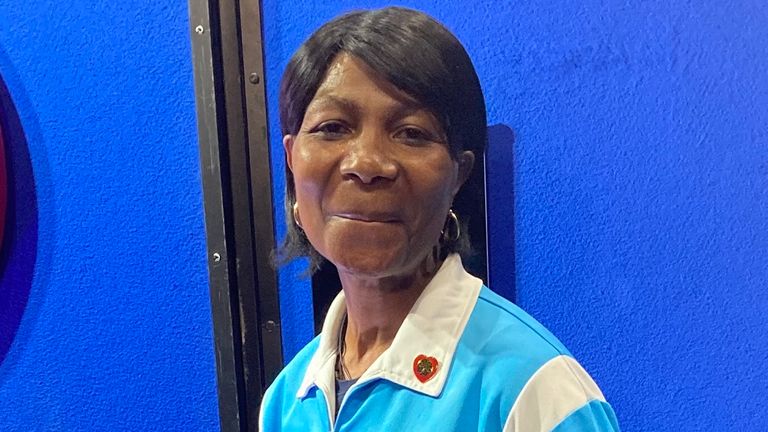Black History Month: Darting legend Deta Hedman hosts Black Arrows: The Next Generation
Darts' original female trailblazer Deta Hedman hears from Natalie Gilbert, African No 1 Devon Petersen, PDC Chief Executive Matt Porter, Chairman of Lancashire and England Darts Tommy Thompson; she also visits inner-London schools and youth centres to explore diversity in the sport
Monday 24 October 2022 06:16, UK
Pioneer and legend Deta Hedman examines diversity in darts, speaking to those in the game to visiting schools and youth centres as she explores how the future of the sport can change for the better.
Darts is quintessentially a pub game which has gradually removed its working-class trappings and turned itself into a multi-million pound industry.
The prize money may have attracted competitors from all around the globe, but there is a sense that the sport has still yet to entice those from ethnic minorities.
- 'The verbal sparring between Van Gerwen, Wright & Price adds a bit of spice'
- 'Van Gerwen favourite for World Championship' I MVG: There's more to come
- Resurgent Aspinall wants Premier League return
Hedman is a trailblazer not only for women's darts, but also for people from Afro-Caribbean backgrounds, along with pioneer Ray Cornibert and African No 1 Devon Petersen.
American Leonard Gates will follow in the footsteps of Hedman, Cornibert and Petersen after making history by winning the North American Darts Championship. He will head to Alexandra Palace in December to play at the World Championship.
Gates' accomplishment is not enough with more needing to be done in order to inspire the next generation, according to Hedman.
"The program is about diversity in darts because there are not many people from an afro-caribbean background in the game. We've been travelling up and down the country to find out why there are not enough people taking the game up," said Hedman, nicknamed 'The Heart of Darts' due to her work with the charity that offers support to disabled children.
"It's a lot of work to be put into progress. We went into a couple of schools in Greenwich and east London to find out if kids had heard of darts and whether they've played the game.
"Some of them had heard about it but they have never actually taken it up so it's going to be a long process which could last up to 10 years. It's all about going into schools and academies to inspire kids from different races.
"Back in the day in my time - I've been around for four decades - it was a working-man's game with a lot of pubs around and to be fair hardly any black people went into the pubs back then, but things have changed now.
"A lot of it has come out of the pub itself so you have got more clubs and academies that are making people feel more comfortable and relaxed about playing the game."
The Jamaican-born veteran boasts an incredible résumé, having amassed more than 200 titles during a career spanning over four decades.
She was the first woman in darting history to record a televised win over a male opponent, toppling Aaron Turner at the 2005 UK Open, and she has broken down barriers since taking up the sport in the mid 80s, challenging the status quo within a white, male-dominated environment.
Former world No 1 Hedman is no stranger to racism, having suffered abuse during her time as a player which eventually forced her to step away from the game.
Hedman recalled how she got into darts, saying: "Playing against my brothers from 301 double-in-double-out brought my game along a lot quicker than it would normally.
"When my mum would be preparing lunch, we would all nip off down the pub, put your name on the board, chalk your turn and then you'd try and stay on the board as long as you possibly can. That's how I got into the game properly."
"I've been around a long time but one of the things about this programme about diversity is to show what you can achieve if you put your mind to it and it's like any sport because you're going to want to do it, enjoy it, and then work hard at it. If you do that then you will reap the rewards," said Hedman.
"Darts is lacking Afro-Caribbean role models, but if you start getting more players coming through from different backgrounds then you'll get more girls and boys coming into the game. It moves forward. Like anything, it's going to take time."
Watch Black Arrows: The Next Generation on Wednesday, October 26 at 9pm on Sky Sports Arena






